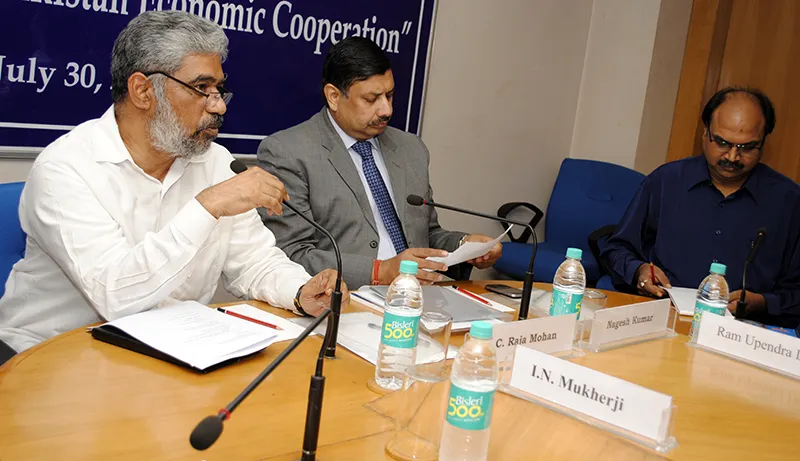-
CENTRES
Progammes & Centres
Location
India and Pakistan can reap multiple benefits from an enhanced cooperation on the economic and energy fronts, according to experts at a recent conference at Observer Research Foundation.

India and Pakistan can reap multiple benefits from an enhanced cooperation on the economic and energy fronts. Opening up of trade can help in creating more stakeholders in both the countries for a stable relationship. A robust India-Pak economic relationship will facilitate a faster economic reintegration of the region.
These were some of the several observations made during a day-long conference on "Prospects for India-Pakistan Economic Relations" organised on July 30 at ORF campus. The conference was attended by noted experts in trade, energy and bilateral relationship.
In the opening session on trade, Prof. Ram Upendra Das, Professor, Research and Information Systems for Developing Countries, made a presentation on ’India-Pakistan Trade and Investment Cooperation: Present Status, Potential and Constraints’. The session was chaired by noted economist, Dr Nagesh Kumar, currently working as Chief Economist, UN-ESCAP & Director, ESCAP Subregional Office for South and South-West Asia.
Dr Das prefaced his presentation with the argument that peace initiatives were more relevant in times of conflict. He said trade was an effective instrument of peace and argued that greater economic integration makes conflicts costlier for the states. Referring to the status of India-Pak trade, he said the economic relationship was characterised by low volume, trade barriers, lack of capacities in Pakistan and overall ambience of suspicion and mistrust. He believed that even a slight improvement in the political atmosphere can have greater economic rewards for both the countries.
Dr Das pointed out that "between 1947 and 1965, India was the most important trading partner of Pakistan accounting 60% of Pakistan exports and 17% of its imports". But since then, wars and conflicts have taken their toll on the economic relationship, leaving Pakistan way below in the Indian trade partnership list. As a result, India has better trade relationship with a smaller country like Bangladesh today.
He said a significant turnaround came about after the Commerce Secretaries of both the countries signed an agreement on April 28, 2011 seeking a mutually agreeable stand on tariffs, non-tariff barriers, MFN status, negative and positive lists, and investments in infrastructure, visa and trading in electricity and petroleum products.
He pointed out that there was much to gain from a more open economic engagement. The trade complementarities were high and both the countries could benefit in terms of lower transportation cost and other logistical benefits if the list of items currently traded between the two countries could be expanded. He said Pakistan, for instance, lost $700 million to $2 billion every year from 2005 to 2010, in importing goods from faraway sources rather than India.
He said some of the bottlenecks in the bilateral trade were sub-optimal economic engagements, perception-gap, infrastructural bottlenecks, poor banking infrastructure and inadequate trade facilitating mechanisms.
Other presenters included Prof. I N Mukherji, a Senior Consultant with RIS, who spoken on Implications of Trade Normalisation between India and Pakistan for India’s Market Access; Dr. Pravakar Sahoo, Institute of Economic Growth, University of Delhi discussed the China dimension affecting India’s trade with Pakistan, Mr. Loknath Acharya, Assistant Director, FICCI and Dr Jayshree Sengupta, Senior Fellow at ORF.
The lead speaker in the session on energy cooperation was Mr. Ali Tauqueer Sheikh, CEO Leadership for Environment & Development (LEAD) & Regional Director, CDKN, Islamabad, Pakistan. He spoke on Pakistan’s energy crisis and possible solutions. The session was chaired by Dr Sunjoy Joshi, Director, ORF.
The other main presenters were Ms Lydia Powell, Senior Fellow, ORF, who spoke on "Is the hydraulic arms race on the Indus a key barrier?" and Mr Uma Shankar of ORF.
The third session, chaired by Dr C Raja Mohan, Distinguished Fellow, ORF, focussed on the political and security factors influencing the bilateral relationship. The panellists included Dr Manoj Joshi, Distinguished Fellow, ORF, Mr Rana Banerji, former Special Secretary, Cabinet Secretariat and Mr Wilson John, Senior Fellow. The panellists spoke about the events in Afghanistan and implications for Pakistan, the civil-military relations and the challenges before the Nawaz Sharif government.
The views expressed above belong to the author(s). ORF research and analyses now available on Telegram! Click here to access our curated content — blogs, longforms and interviews.